Staying in Control
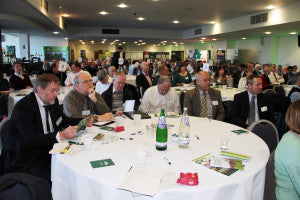
The annual Amenity Forum Conference took place at Leicester City Football Club's King Power Stadium, on 16th October.
The event was well attended with around 190 delegates, a packed schedule of speakers and many sponsors and exhibitors, including Spray CDA.
John Moverley, Chair of the Amenity Forum opened proceedings, welcoming everyone and explaining the theme of the event "Staying in Control". John said; "These are challenging times for our sector but we are delighted with the commitment being shown to best practice in weed, pest and disease control. More and more are committed to operating at Amenity Assured standards and the Forum has a growing membership."
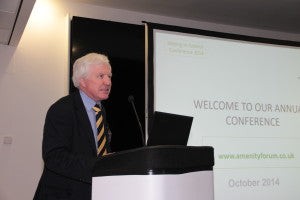
With pressure from the Water Framework and Sustainable Use Directives to minimise pesticide use, along with maintaining high standards, often within very tight cost constraints, there are some real challenges facing the Amenity Sector. With this in mind, an Integrated Approach to pesticide use, self policing, water protection and training were all key elements of the day's discussions.
Updating
The first part of the morning session gave an update on the sector, with Grant Start of the HSE Chemicals Regulations Directorate giving an overview of the implementation of the National Action Plan, which is on target. It is worth mentioning a number of changes which will be coming into force over the next 2 years; from 26th November 2015 'Grandfather Rights' are withdrawn, meaning all sprayer operators must hold a valid Certificate of Competence; also on this date, all pesticide distributors must have sufficient BASIS trained staff to be able to give advice and, from 2015, all vehicle mounted spraying equipment must be independently tested in accordance with NSTS Standards.
In response, John Moverley and Paul Singleton of BASIS reaffirmed the Forum's commitment to training and compliance with the launch of the Education, Training, Skills and Compliance 10 Key Points document which mirrors many of the requirements of the National Action Plan.
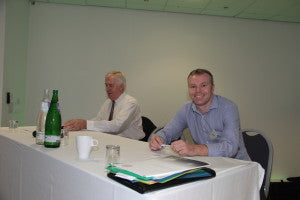
Integrated Control
This was a key theme of the event with a number of speakers discussing their take on Integrated Control with a number of case studies. Ruth Mann, Head of Research at STRI, gave a fascinating insight into the way in which integrated control can minimise disease incidence and reduce pesticide inputs on managed turf, starting off the process by planning for prevention through intelligent design of stadiums to allow good light and airflow and suitable species selection.
She discussed the importance of cultural controls, many of which we carry out automatically but would not necessarily attribute them as an Integrated Control, such as application of fertiliser and renovation work before considering biological controls and finally pesticide use, and reminded us that there is no substitute for getting out there and taking a look, especially when it comes to disease management.
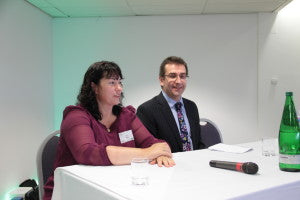
Anne Mette Dahl Jensen, of the University of Copenhagen, and Adrian Dixon, Head of the Policy Implementation Team at CRD, gave a European perspective with Adrian updating us on the implementation of policy change across Europe; suffice to say it's complicated, but the UK is on track.
Anne explained the pesticide regulations in Denmark and how they are being met. Again a strong focus was on integration with non-herbicide options such as scrubbing, street sweeping and burning, coupled with extensive work within the golf course industry and agriculture to minimise inputs as much as possible. Interestingly, Denmark do not have a complete ban on pesticide use as some perceive it; more an increased tolerance of weeds in certain sectors and a push to minimise use as much as possible. They still allow the use of pesticides to control giant hogweed, for example.
Case Studies
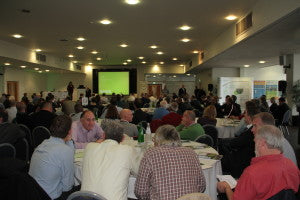
The afternoon session kicked off with a number of industry case studies. David Wain is the Environmental Technical Officer for the £2.2 billion Streets Ahead PFI initiative in Sheffield. The 25 year maintenance project aims to use an integrated approach to reduce pesticide use and completely refurbish over 70% of the city's roads within the first 5 years.
He explained the way in which they are using weed ripping, street sweeping and a change of herbicide application to achieve a weed free aspiration. David explained how they have reduced herbicide applications and, through increased staff training and awareness, are encouraging sprayer operatives to see herbicides as dangerous products to be used very carefully and sparingly, rather than as a low hazard product which can be applied anywhere.
Next, Mike Clough of the Invasive Non-Native Specialists Association ensured there was no chance of a post lunch lull with a highly entertaining presentation on controlling invasive weeds. Whilst some of Mike's presentation was firmly tongue in cheek, his message wasn't. It is easy to forget, when talking about reducing pesticide inputs, increasing weed tolerance levels and reducing budgets that invasive weeds are an ever increasing problem which need careful management by qualified, trained professional contractors.
Water
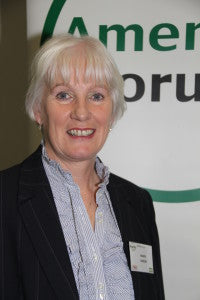
Watch Out! Do you know what you're buying?
Manda Sansom, Technology Development and Stewardship Manager for Monsanto, continued proceedings with an update on glyphosate re-registration, an ongoing process which must be done for all plant protection products every 10 years as part of regulatory control. Manda went on to talk about the Watch Out for Illegal Pesticides campaign which was launched in the agriculture sector in January. It's a frightening statistic that 10% of the pesticides we are using in the UK may be illegal or counterfeit, and this is the tip of a global iceberg worth an estimated €4.4bn a year, she reported.
Information on Watch Out for Illegal Pesticides is available from the CRD www.pesticides.gov.uk and the Amenity Forum, and a leaflet is available. Use of illegal pesticides has a number of far reaching consequences; the pesticide may not be safe to use and use of illegal pesticides runs the risk of prosecution. The guidance gives some tips on how to protect yourself from illegal products, including ensuring that you are buying only reputable, known products from reputable BASIS registered suppliers, making sure that products received have clear and legible labels and match what you have been invoiced for; and remember that, if you are offered something that appears to be too good to be true, then usually it is!
Mark De'Ath of Headland Amenity concluded the session with a talk on The Way Forward; he illustrated the number of weed control products available in the 80s versus those approved for hard surface use today. We are now working with a much smaller, but much safer range of products, but there is still work to be done to make sure we are working as safely as possible to minimise unnecessary use and protect the environment and drinking water supplies.
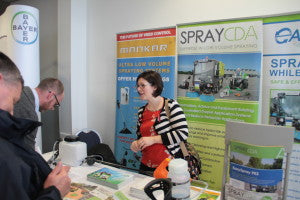
The overall mood was one of optimism with a strong focus on Integrated Control. Real progress is being made and real steps forward in the availability and adoption of new technology and working practices which was demonstrated by the excellent representation and range of sustainable technologies such as Low Volume and the new Ubiquitek electric weed control system.
The Amenity Forum will be holding a number of Updating Events in the new year. Come along to find out more about what the Forum can do for you. Events are open to everyone within the Amenity Sector. To coin a phrase, we're better together! Have I heard that somewhere else recently?

Technical Manager
BSc Hons MBPR (20031356R/E/5354/ICM)
Tel: 01902 440261
Mobile: 07535 546021
Twitter: @SprayCDA
